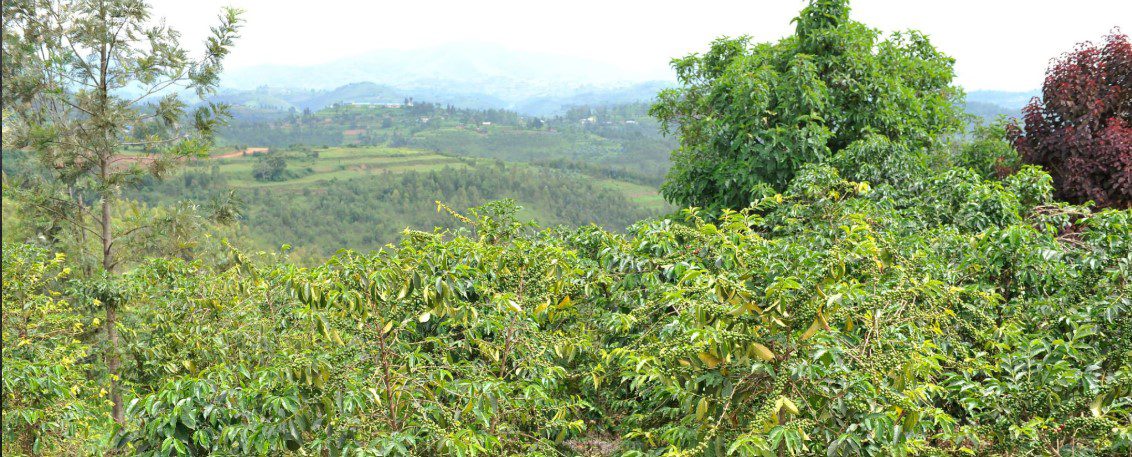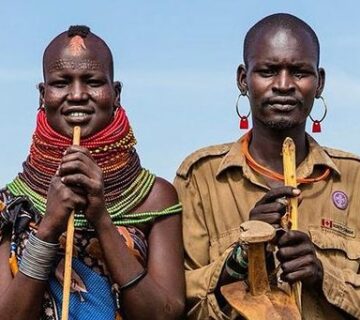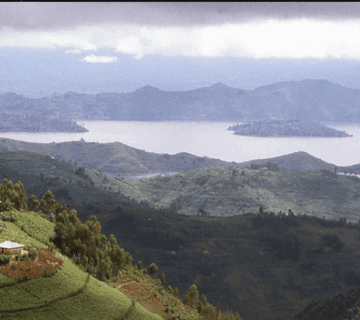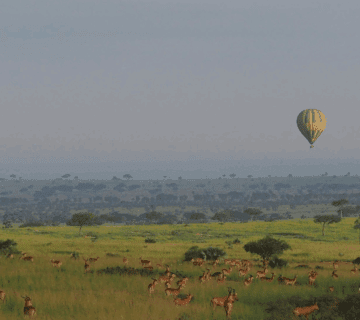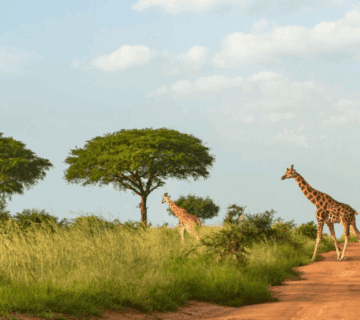Can I Visit a Coffee Farm in Rwanda?
If you’ve ever tasted a cup of rich, aromatic coffee, there’s a good chance it was sourced from the highlands of Rwanda, often referred to as the “Land of a Thousand Hills.” Rwanda is renowned for its breathtaking landscapes and rich cultural heritage, but one of its most treasured gems is the coffee it produces. Known for its high quality and exceptional flavor profiles, Rwandan coffee is a true reflection of the country’s fertile soils, ideal climate, and meticulous farming practices.
For those wondering whether it’s possible to visit a coffee farm in Rwanda, the answer is a resounding yes. The country offers an immersive, educational, and inspiring experience for coffee enthusiasts and travelers alike. Visiting a coffee farm is not only a chance to witness the meticulous process of coffee production but also an opportunity to connect with local farmers and learn about their traditions, challenges, and passion for this beloved crop.
Exploring Rwanda’s Coffee Culture
Rwanda’s coffee industry is a vital part of the economy, with coffee being one of the country’s most important exports. The combination of volcanic soils, altitude, and a favorable climate creates ideal conditions for growing high-quality Arabica beans. Coffee is grown primarily in the highland regions of the country, including areas like the Western Province, where you’ll find lush green hills dotted with coffee farms.
When you visit a coffee farm in Rwanda, you’ll experience more than just a tour; you’ll be enveloped in the country’s coffee culture. You’ll learn about the different varieties of coffee, the methods used to harvest and process the beans, and the challenges farmers face to produce the perfect cup. The pride and dedication of the farmers are palpable as they guide you through every step of the coffee-making process.
Where to Visit Coffee Farms in Rwanda
There are several regions in Rwanda where you can visit coffee farms, each offering a unique experience. Among the most popular regions for coffee tourism are the Western Province and the areas surrounding the beautiful Lake Kivu. Some of the top coffee farms and cooperatives that welcome visitors include: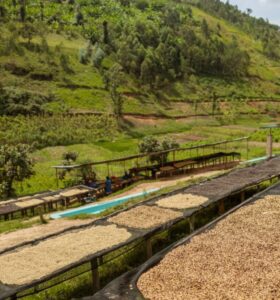
The Kinunu Coffee Cooperative Situated on the shores of Lake Kivu, the Kinunu Coffee Cooperative offers an insightful tour into the traditional methods of coffee production. Here, you can witness the entire coffee journey, from the cultivation of the beans to their washing, drying, and roasting processes.
Gahahe Coffee Cooperative Located in the picturesque Nyundo region, Gahahe is one of the best places to explore Rwanda’s coffee heritage. The cooperative’s farmers produce high-quality coffee, and the tour gives visitors a chance to understand how the cooperative works and the positive impact it has on local communities.
Gisovu Coffee Farm – Gisovu is one of the oldest coffee farms in Rwanda, offering tours that highlight the farm’s sustainability practices and innovative farming methods. The farm sits on the edge of Nyungwe Forest, providing stunning views and an unforgettable experience.
Mugongo Coffee Cooperative Nestled in the hills of the Western Province, Mugongo Cooperative offers a fascinating glimpse into the life of a coffee farmer. You’ll have the opportunity to meet local farmers, learn about their sustainable practices, and even sample freshly brewed coffee straight from the farm.
These are just a few of the coffee farms and cooperatives in Rwanda that offer engaging and educational tours. Many of these farms are run by local cooperatives, which means that your visit not only supports the coffee industry but also the community at large.
What to Expect on a Coffee Farm Tour
Visiting a coffee farm in Rwanda is an experience that allows you to appreciate the coffee in your cup in an entirely new way. Here’s what you can expect during your tour:
Coffee Farming Techniques: The journey begins with an introduction to the farming techniques used by the local farmers. You’ll learn about the types of beans grown, including Arabica, and the various stages involved in producing coffee. From planting the coffee trees to the intricate process of hand-picking the ripe cherries, you’ll gain a deep understanding of how much effort goes into each cup of coffee.
Processing the Beans: After harvesting the cherries, they undergo a series of steps to transform them into the beans that are roasted and brewed. On a coffee farm tour, you’ll see how the beans are sorted, washed, and dried. The processing methods can vary from farm to farm, but you’ll get an up-close look at traditional and modern techniques.
Learning from the Farmers: One of the highlights of a coffee farm tour is the opportunity to meet the farmers themselves. Rwandan coffee farmers are passionate about their craft, and many are eager to share their stories, challenges, and insights with visitors. By talking to the farmers, you’ll gain a deeper appreciation for the hard work and dedication that goes into coffee production.
Tasting Fresh Coffee: No coffee farm tour would be complete without tasting the fruits of the labor. At the end of the tour, you’ll often have the chance to sample freshly brewed coffee, prepared with beans harvested directly from the farm. You’ll also get to learn about the different flavor profiles of Rwandan coffee, from fruity and floral to earthy and bold.
Cultural Exchange: Beyond the coffee, your visit to a Rwandan coffee farm is also a cultural experience. You’ll have the chance to interact with local farmers and community members, learn about Rwandan traditions, and even participate in activities such as coffee picking or washing the beans.
Why You Should Visit a Coffee Farm in Rwanda
Visiting a coffee farm in Rwanda is more than just a sightseeing activity; it’s an enriching and meaningful experience. Here are a few reasons why you should consider adding a coffee farm visit to your Rwandan itinerary:
Support Local Farmers: By visiting a coffee farm, you directly support the farmers and their communities. Many of the coffee cooperatives in Rwanda are run by smallholder farmers who rely on coffee as their primary source of income. Your visit helps sustain their livelihoods and promotes fair trade practices.
Deepen Your Coffee Knowledge: If you’re a coffee lover, visiting a coffee farm gives you a chance to deepen your knowledge of the coffee industry. You’ll understand the journey of coffee beans from seed to cup and learn how different growing conditions affect flavor. It’s an experience that will forever change the way you enjoy your coffee.
Experience Rwanda’s Natural Beauty: Rwanda’s coffee farms are situated in some of the country’s most beautiful and scenic regions. From the lush hills of the Western Province to the stunning views of Lake Kivu, the landscapes are awe-inspiring and offer a peaceful escape from the hustle and bustle of everyday life.
Cultural Immersion: Coffee farming is a deeply rooted tradition in Rwanda, and visiting a farm offers a rare chance to immerse yourself in the local culture. The warmth and hospitality of the people make the experience all the more special.
Sustainable Tourism: Coffee farm visits promote sustainable tourism practices, as they allow visitors to connect with the land and the people while supporting environmentally conscious and ethical practices.
Conclusion
A visit to a coffee farm in Rwanda is an unforgettable experience that connects you with the heart and soul of the country. You’ll gain a deeper understanding of the art and science of coffee production, enjoy breathtaking landscapes, and interact with passionate farmers dedicated to producing some of the best coffee in the world. Whether you’re a coffee connoisseur or simply curious about the process, Rwanda’s coffee farms offer an enriching journey that will leave you with a newfound appreciation for every cup you sip. So, if you’re wondering, “Can I visit a coffee farm in Rwanda?” the answer is yes and it’s an experience you won’t want to miss.

